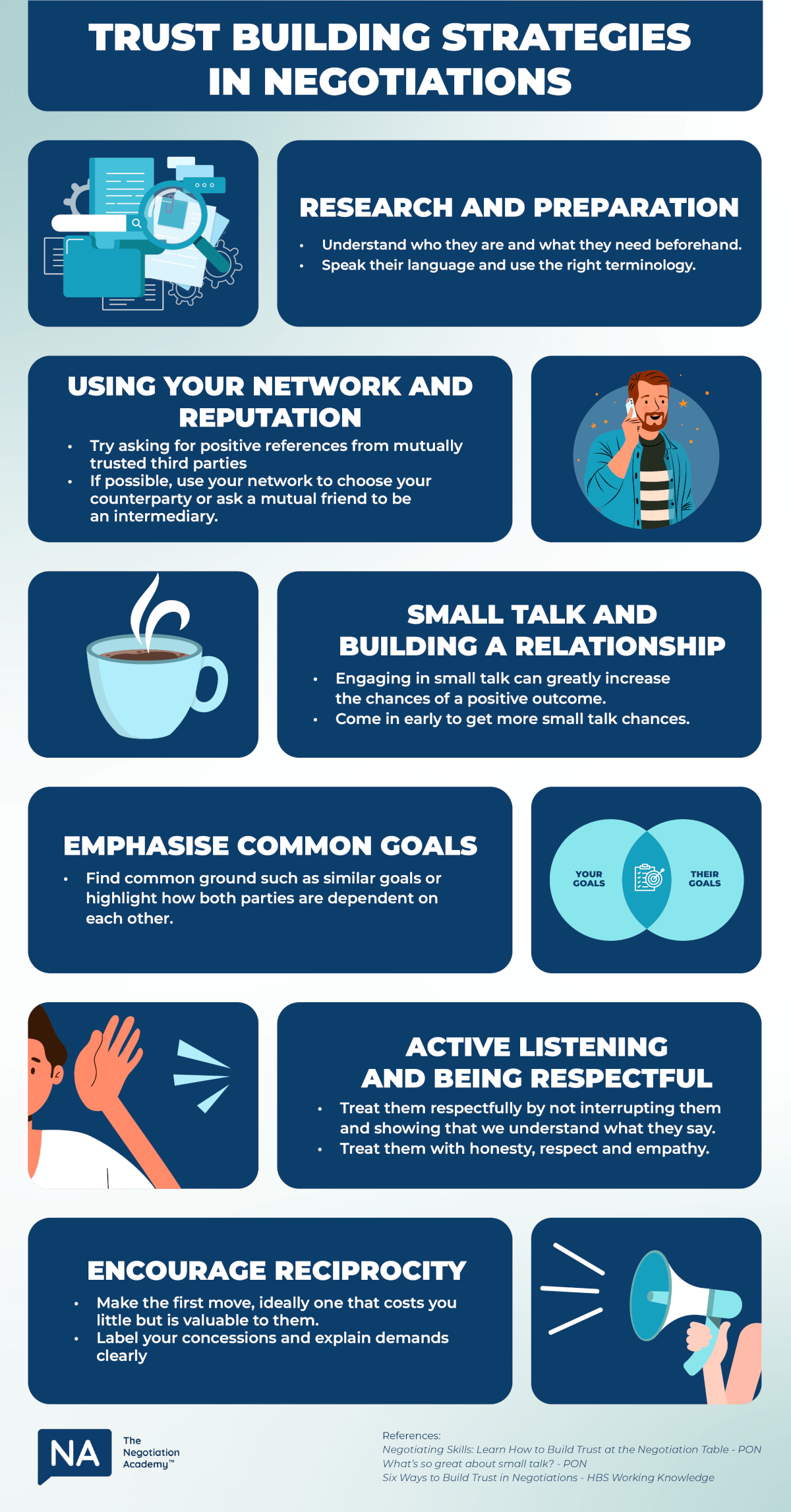
Successful negotiations need trust. Great preparation, strategies, and tactics play a key role in negotiations, but you will not win successful outcomes without trust.
Without trust, negotiations often spiral into competitive cycles where both parties withhold information, pushing them further into a win-loss situation.
Breaking this cycle requires trust. When you create a foundation of trust, you can focus on creating value for both sides. Once the pie is as big as possible, we can return to bargaining.
Trust can similarly be built by managing communication and making the first move toward openness. Reciprocity plays a significant role here—people mirror how they are treated. If you extend trust, you are more likely to receive it in return.
The Trust Advantage: Why Trust is Important in Negotiations
Building trust opens the door to collaboration, reduces friction, and helps uncover interests and potential solutions that may not have surfaced otherwise. But remember: trust is a reciprocal process and “You have to give it to get it.”
During my courses, I often emphasize that trust is built by mirroring behaviors—setting the tone for positive interactions through your energy and approach.
This ties into the concept of mirror neurons, where people unconsciously mimic the energy and emotions they perceive. In this example where this traveler’s strong positive energy changed a ‘Debbie Downer’ to a ‘Debbie Dazzle
The lesson? If you bring trust into the room, it sets the tone for the entire negotiation.
Practical Steps to Building Trust in Negotiations

1. Research and Preparation
Before you walk into a negotiation, thoroughly understand your counterpart. Who are they? What do they value? What are their needs?
While you are preparing, make educated guesses about their reserve price and your reserve price along with possible concessions you can provide them. The ideal concession is one that costs your party very little but is valuable to your counterparty.
Knowing these details in advance shows that you care about their interests, helps establish credibility from the start, and even gives you opening ammunition to build trust via concessions. We cover more about preparation, together with a checklist, here.
Example: If you’re negotiating with a company that values sustainability, highlight your shared commitment to eco-friendly practices. Showing that you’ve done your homework demonstrates respect and builds trust.
2. Leverage Your Network
Word of mouth is still as powerful as ever, and trust is often transferred through relationships. Use your network to find common connections that can vouch for your trustworthiness.
Mutual friends or professional contacts can build credibility and create a foundation of trust before you even enter the negotiation room.
When the opportunity to choose your own counterparty arises, you could leverage your network to recommend a trustworthy counterparty.
Want more strategies for networking? Check out this post.
Example: If you share a mutual colleague, ask them to introduce you. A recommendation from someone they trust will make them more likely to trust you.
3. Manage Your Reputation
Your reputation precedes you. Ensure you have a good track record, as this will influence the other party’s perception of you.
If necessary, ask for references from previous negotiations or mutual acquaintances to demonstrate your reliability and integrity.
Example: A positive reputation is essential in industries where relationships matter, like law or finance. If you’re entering a negotiation for a high-stakes deal, references can help assure the other side that you’re a reliable partner.
4. Engage in Small Talk and Build Relationships
Small talk has been proven to build rapport and improve negotiation outcomes.
Arriving early for a meeting allows you to engage in informal conversations, which helps create a personal connection before diving into the negotiation.
Example: Chatting about common interests, such as a shared passion for sports or hobbies, can ease tension and make the negotiation feel more human.
5. Emphasize Common Goals
Not all negotiations will be solely about bargaining, and there should be room for common interests in many of your negotiations.
One of the best ways to build trust is to highlight shared objectives. When both parties realize they are working toward the same goal, they are more likely to trust each other. We also cover this in our interest-based negotiation post.
Example: In a business negotiation, emphasize how both companies will benefit from a long-term partnership. Frame the conversation around how collaboration can lead to mutual success.
6. Active Listening and Respect
Empathy, respect, and honesty are critical components of trust-building. These are best displayed during face-to-face interactions, and there is a case for having face-to-face interactions with your counterparty both during and outside of negotiations.
During negotiations, active listening shows that you’re genuinely invested in what the other party has to say. Reflect on their concerns to demonstrate that you understand their perspective. This is also one way to show them respect.
Example: If your counterpart raises a concern about pricing, acknowledge their worry and explore solutions that could meet both your needs. Listening without interrupting also fosters an environment of respect.
7. Reciprocity and Unilateral Concessions
Sometimes, it pays to make the first move. Making small unilateral concessions without asking for anything in return signals trust. Once you make the first move, the other party will often feel compelled to reciprocate, opening the door to further collaboration.
Example: To start the negotiation, offer a small concession, like flexible payment terms. When labeled correctly, this can prompt the other side to make a similar move.
8. Label and Explain Your Concessions
Always label your concessions so the other party recognizes them. When you make a concession, explain why you’re doing so and what you hope to achieve.
Unfortunately, your counterparty is not always incentivized to acknowledge your concession. Explaining it and labeling it clearly beyond a reasonable doubt helps draw attention to your gestures, fostering a feeling of trust and reciprocity.
You can also find out more about concession strategies post.
Example: “I’m offering a 10% discount because I believe this long-term partnership will benefit us both. I hope this helps us move forward together.”
Cultural Considerations in Trust-Building
Different cultures approach trust and negotiation differently. In some cultures, aggressive bargaining is expected, while in others, such tactics can be seen as disrespectful. Be sure to adjust your trust-building strategies to align with cultural expectations.
Example: In Western cultures, trust might be built through transparency and directness, whereas in some Asian cultures, trust is built through patience and relationship-building over time.
Conclusion: Trust as the Key to Successful Negotiations
Reputation means the world to negotiators; trust is part of maintaining that reputation.
By building trust through research, small concessions, active listening, and strategic transparency, you can break out of the competitive cycle and foster a collaborative environment that leads to win-win solutions.
It helps to remember that negotiation still requires communicating with other people, and that trust is both a mindset and a strategy. Approach every negotiation with the intention of building long-term relationships, and you’ll see better outcomes for all involved.
By following these principles, you can make trust-building a cornerstone of your negotiation strategy, ensuring successful, sustainable agreements time and time again.
Want to see some negotiation principles in action in real life, or pick our brains in real time? Try one of our online courses or join a tailor-made live training session for your organization.
Joining one of our courses will put you on par with over 10,000 leading lawyers from Fortune 500 companies to Tier 1 law firms globally, boosting your negotiation skills to new heights.
—
If you enjoyed this content, join our free 10-week Email course on the fundamentals of Collaborative and Competitive Negotiation skills by clicking HERE.
Each week, you will get a bite-size email unpacking some of the most fundamental negotiation concepts that you can apply in your everyday negotiations, along with an insight video and book recommendation to go further in areas you want to learn more about.
Further Reading:


